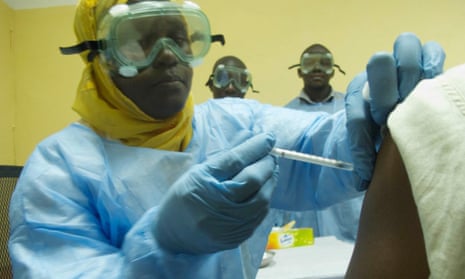The World Health Organisation has announced it hopes to begin testing two experimental Ebola vaccines in west Africa by January and may have a blood serum treatment available for use in Liberia within two weeks.
The UN’s health agency said it aimed to begin testing the two vaccines in the new year on more than 20,000 frontline health care workers and others in west Africa – a bigger rollout than previously envisioned.
Separately, a senior Red Cross official said he was confident the epidemic could be contained within four to six months.
Elhadj As Sy, the secretary general of the International Federation of Red Cross and Red Crescent Societies, told reporters in Beijing on Wednesday that the outbreak could be contained if there was “good isolation, good treatment of the cases which are confirmed, good dignified and safe burials of deceased people.”
Dr Marie Paule Kieny, an assistant director general at the WHO, said the first tens of thousands of Ebola vaccines could be distributed in the first months of the new year. Kieny acknowledged there were many “ifs” remaining and “still a possibility that it [a vaccine] will fail”. But she sketched out a much broader experiment than was imagined only six months ago.
“These are quite large trials,” she said.
Kieny said in remarks reported by the BBC that a serum was also being developed for use in Liberia based on antibodies extracted from the blood of Ebola survivors. “There are partnerships which are starting to be put in place to have capacity in the three countries to safely extract plasma and make preparation that can be used for the treatment of infective patients.
“The partnership which is moving the quickest will be in Liberia where we hope that in the coming weeks there will be facilities set up to collect the blood, treat the blood and be able to process it for use.”
A WHO spokeswoman, Fadela Chaib, said the agency expected 20,000 vaccinations in January and similar numbers in the months afterwards using the trial products.
An effective vaccine would still not in itself be enough to stop the outbreak but could protect the medical workers who are central to the effort. More than 200 of them have died of Ebola.
The real-world testing in west Africa will go forward only if the vaccines prove safe and trigger an adequate immune-system response in volunteers during clinical trials that are either under way or planned in Europe, Africa and the US. The preliminary safety data is expected to become available by December.
One of the vaccines that Kieny mentioned, Okairos AG, is being developed by the US National Institutes of Health and GlaxoSmithKline from a modified chimpanzee-cold virus and an Ebola protein. It is being made in Rome, according to GSK, with clinical trials under way in Britain and Mali.
“We have other vaccine facilities around the world and we are seeing what we can do to ramp up production to commercial scale,” said Mary Anne Rhyne, GSK’s US director of external communications.
The second frontrunner, developed by the Public Health Agency of Canada and known as VSV-EBOV, has been sent to the US Walter Reed Army Institute of Research in Maryland for testing on healthy volunteers. It would also be tested shortly among volunteers in Switzerland, Germany, Gabon and Kenya, Kieny said.
Separately, the Canadian drugmaker Tekmira Pharmaceuticals announced on Tuesday it had begun limited manufacturing of a therapeutic product targeting the Ebola-Guinea virus.
Tekmira said on Tuesday that the new product, part of its TKM-Ebola programme, would be available by early December. But it did not specify how many doses it was making, or whether it was a drug or vaccine. Its TKM-Ebola programme is aimed at developing a treatment to stop the virus replicating in an infected person.
The European Medicines Agency said on Monday it was ready to offer Ebola treatments and vaccines the benefits of “orphan” drug status – including extended market exclusivity – in a bid to encourage their development.
Orphan drug status is given to compel companies to develop treatments for rare conditions, which they might not otherwise make because of lower profit chances.
Mapp Biopharmaceutical – which gave its experimental Ebola treatment ZMapp to US medical workers Dr Kent Brantly and Nancy Writebol, who recovered after contracting Ebola in Liberia, and to at least one Spanish priest, who died – said it had begun manufacturing the drug using conventional methods that would produce greater quantities for more human testing.
The outbreak in west Africa has killed more than 4,500 people, mostly in Liberia, Guinea and Sierra Leone, since it began 10 months ago. Experts have said the world could see 10,000 new cases a week in two months if authorities did not take stronger steps.
Sierra Leone said on Tuesday the number of infected people in the country’s western region was soaring, with more than 20 deaths a day. The region is on the opposite side of the country from where the first cases emerged.
Also on Tuesday, the WHO’s Chaib promised a thorough public audit of the agency’s early missteps in responding to the Ebola crisis but said for the moment “our focus is on the response”.
Reuters and the Associated Press contributed to this report

Comments (…)
Sign in or create your Guardian account to join the discussion